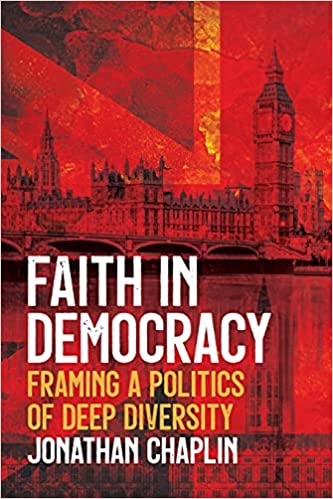Dr David McIlroy is Chair of Trustees at KLC. He is a practising barrister and is Adjunct Professor at the University of Notre Dame (USA).
Faith in Democracy: Framing a Politics of Deep Diversity by Jonathan Chaplin, former director of the Kirby Laing Institute for Christian Ethics, is both a defence of democracy and a defence of the role of faith-based convictions in influencing the political process. Chaplin is steeped in the Kuyperian tradition, understands Christian Democracy, and is au fait with developments in Christian political theology, both Protestant and Catholic. Faith in Democracy wears this learning lightly. It is a book for practitioners, providing an accessible introduction to a Christian vision for the future of democratic politics in pluralist societies.
In chapter 1, Chaplin argues that democracy “must be understood in terms of the larger moral purpose it exists to serve” (p.10). That purpose is the pursuit of “public justice” (p.12). Public justice “names that part of the common good that falls uniquely within the remit of the political community” (p.23). This substantive objective renders democracy more than merely the populism of the common will.
In chapter 2, Chaplin demonstrates how Christians have reasons to support democracy, as a method for institutionalising the people’s consent to their rulers (pp.33-35), as a means of allowing the people to participate in their government (pp.35-38) and as a defence against grave injustice resulting from the undue accumulation of power (pp.39-40).

In chapter 3, Chaplin defends a Christian vision of a pluralist public square. On the one hand, he condemns exclusive secularism as illiberal and as failing to recognise its own faith commitments (p.59). On the other hand, he argues for “jurisdictional secularism,” which “holds that the state should adopt an official stance of impartiality towards the plural faiths of its people and guarantee extensive religious freedom for all” (p.57). Impartiality comes, Chaplin maintains, only at the moment of promulgation of the official ruling. Until then, the people and their representatives are fully entitled to appeal to as much of their faith commitments as they choose. Although they would be wise “to offer convincing defences of their favoured policies that reach as wide a public as possible” (p.85), there is no a priori reason why such defences should eschew appeals to religious doctrines or language.
In the last four chapters of the book, Chaplin explores what faithful speech, faithful conscience, faithful association and faithful power look like. Faithful speech is speech informed by our deepest convictions, which is committed to contributing to the good of the whole public (p.108). Such speech will treat our fellow citizens with respect (p.110) and be “directed to the task of discerning the requirements of public justice” (p.117) rather than seeking privileges for our own causes, associates or associations. Chaplin’s Christian democratic pluralism would give “ample legal space for ‘faithful conscience’” (p.127), in which such freedom is not subordinated to blanket demands made in the name of equality (p.144). Christian democratic pluralism would allow faith-based associations to express their religious identity more fully when collaborating with the state in the provision of public services. Faithful power is about deploying “the resources of faith towards projects pursuant to public justice” (p.223) rather than attempting to revive a Christian nation or to seek the levers of power.
Faith in Democracy is a triumph of explanation. Chaplin has distilled a lifetime of reflection on the Christian approach to democratic politics into a digestible handbook and a compelling manifesto for principled pluralism.
The Kirby Laing Centre for Public Theology in Cambridge. Charity registered in England and Wales. Charity Number: 1191741
Kirby Laing Centre, The New Mill House, Unit 1, Chesterton Mill, French’s Road, Cambridge, CB4 3NP
© 2022 The Kirby Laing Centre for Public Theology in Cambridge